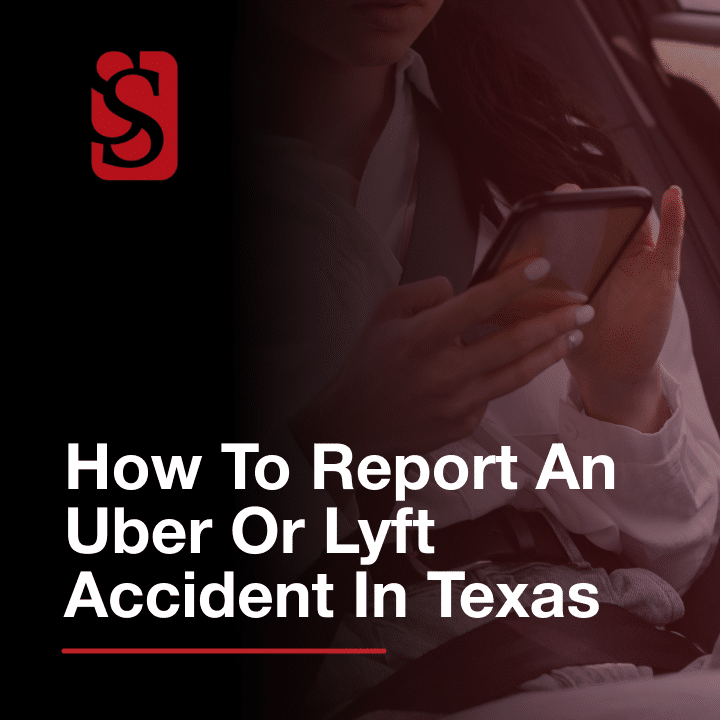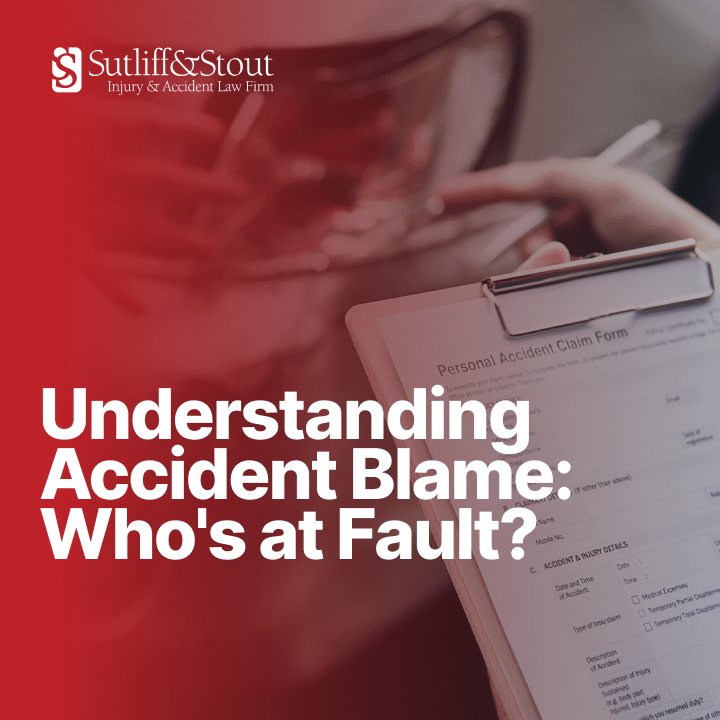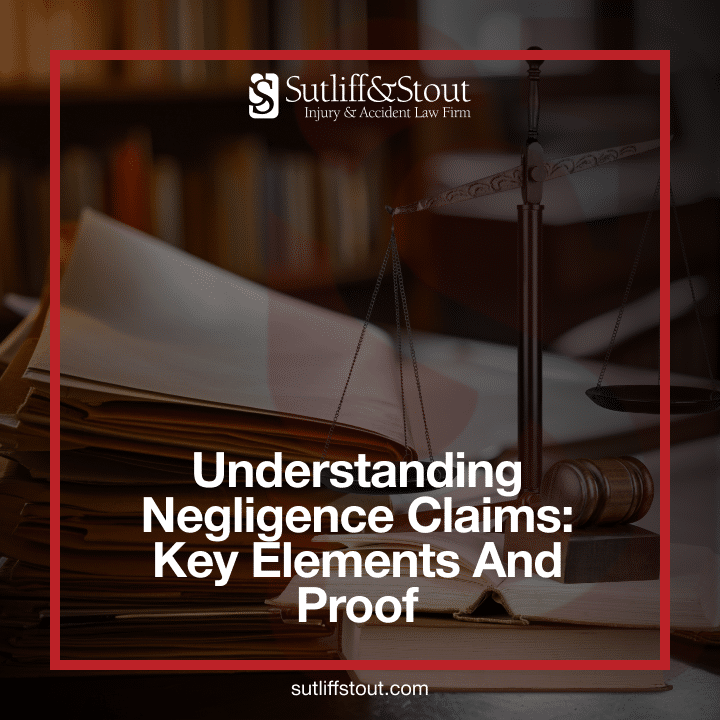 If you’re involved in an Uber or Lyft accident in Texas, it’s crucial to follow the right steps to ensure your safety, legal compliance, and the proper processing of your claim. A rideshare accident lawyer at Sutliff & Stout can help guide you through this complex process, ensuring your rights are protected and you receive the compensation you deserve.
If you’re involved in an Uber or Lyft accident in Texas, it’s crucial to follow the right steps to ensure your safety, legal compliance, and the proper processing of your claim. A rideshare accident lawyer at Sutliff & Stout can help guide you through this complex process, ensuring your rights are protected and you receive the compensation you deserve.
Accident Reporting Requirements for Uber and Lyft Accidents in Texas
In Texas, reporting an accident to law enforcement is not just a recommended step—it’s a legal obligation under certain circumstances. Whether you are involved in a traditional vehicle collision or a rideshare accident involving Uber or Lyft, it is essential to understand when and how to report the incident to the proper authorities to ensure legal compliance. Failing to do so can result in penalties and complications that may affect your ability to make an insurance claim or seek compensation for your injuries.
When to Report an Accident in Texas
Injuries or Deaths
If the accident results in any injury (no matter how minor) or a fatality, the law requires that the incident be reported to law enforcement immediately. Injuries may not always be immediately apparent, especially in cases involving whiplash, internal injuries, or concussions, so it’s crucial to report the accident even if no visible injuries are apparent at the time.
Significant Property Damage
If the accident causes significant property damage—typically defined as damage exceeding $1,000 in value—law enforcement must be notified. This includes damage to vehicles, structures, road signs, or any other property involved in the accident. Property damage could be more extensive than it appears at first glance, so it’s important to assess the full extent of the damage.
Hit-and-Run Accidents
If the other party involved in the accident leaves the scene without exchanging information, this is considered a hit-and-run. In Texas, this must be reported to law enforcement immediately. Failing to do so can result in severe criminal charges for the fleeing driver, but also complicate your ability to recover damages from your own insurance or from the rideshare company.
DUI/DWI Involvement
If you suspect that the accident was caused by a driver under the influence of alcohol or drugs, the incident must be reported to law enforcement. Officers will investigate the potential impairment and determine whether any charges should be filed. This type of investigation can also affect the insurance claims process, as drunk or impaired driving could make the other party liable for all damages.
Accidents Involving Unlicensed or Uninsured Drivers
If either driver involved in the accident is driving without a valid license or insurance, Texas law requires that the crash be reported to the police. This can significantly impact the ability to recover damages, as you may need to pursue alternative routes for compensation (such as through your own uninsured motorist coverage or the rideshare company’s insurance).
What Happens if You Don’t Report an Accident in Texas?
Failing to report an accident when required can result in several serious consequences:
Legal Penalties
Texas law treats failure to report an accident as a violation. Suppose you are involved in an accident that meets the criteria for mandatory reporting and fail to contact law enforcement. In that case, you may face fines or criminal charges, particularly if the accident results in injuries or significant property damage. In extreme cases, failure to report a serious accident could lead to misdemeanor or felony charges, depending on the circumstances.
Difficulty with Insurance Claims
Insurance companies, both yours and the other driver’s, rely heavily on police reports to process claims. Without an official report, there may be delays or complications in the investigation or even outright denial of your claim. This is especially true for rideshare accidents, where insurance policies can be complex, and law enforcement reports play a critical role in establishing liability.
Potential Loss of Liability Protection
In cases of serious accidents, a police report is critical for establishing fault. If you fail to report the accident, you risk losing a key piece of evidence that could protect your rights and help you receive compensation for your injuries. Without an official record, you may face difficulties proving the other driver’s fault, especially in the case of a rideshare accident where multiple parties (driver, Uber or Lyft, other vehicles) may be involved.
Complicated Legal Proceedings
If you decide to pursue a personal injury lawsuit or other legal action following an Uber or Lyft accident, not having a police report could hinder your case. Courts generally rely on police reports to verify details of the accident, and an absence of such a report could weaken your case or complicate legal proceedings, leaving you with a less favorable outcome.
How to Report an Auto Accident in Texas
When you are involved in an Uber or Lyft accident, it’s crucial to follow the proper procedures to report it to the authorities:
Call Law Enforcement
You should call 911 immediately after the accident if there are any injuries, fatalities, or significant property damage. The dispatcher will send officers to the scene to assess the situation, file a report, and provide an accident number for your records.
File a Report with the Texas Department of Transportation (TxDOT)
In cases where the law enforcement officers do not respond (e.g., if the accident is minor or there are no injuries), Texas law may require you to file a crash report with the Texas Department of Transportation (TxDOT) within 10 days. This report must include details about the crash, including the parties involved, the damage, and any contributing factors such as road conditions or weather.
Cooperate with Investigations
If law enforcement responds to the accident, cooperate fully with their investigation. Provide accurate information about the accident, the vehicles involved, and any witnesses. Do not admit fault at the scene, as this can complicate your legal and insurance proceedings later. Allow law enforcement to assess the situation and determine fault.
Obtain a Copy of the Police Report
After the police report is filed, make sure to request a copy for your own records. This report will serve as important documentation for your insurance claim and any legal action you may take following the accident.
How to Report the Accident to the Rideshare Company
Reporting an accident to Uber or Lyft is crucial after an Uber or Lyft accident in Texas. Both rideshare companies have transparent procedures to ensure that accidents are adequately documented and investigated and that appropriate insurance coverage is activated. Whether you were a passenger, the driver, or another party involved in the accident, it’s essential to follow the correct steps for reporting the incident. Below, we break down how to report an Uber or Lyft accident, including what information you’ll need and the tools available to assist you.
Reporting an Accident to Uber
If you’re involved in an accident while using the Uber app (either as a passenger or another party), here’s how to report the incident to Uber:
- Understanding Negligence Claims: Key Elements and Proof - April 6, 2025
- Negligence vs. Accident: Key Differences - April 6, 2025
- What Legal Steps Do Car Accident Lawyers Take to File a Car Accident Claim - March 15, 2025








 (713) 405-1263
(713) 405-1263  550 Post Oak Blvd, Suite 530
550 Post Oak Blvd, Suite 530